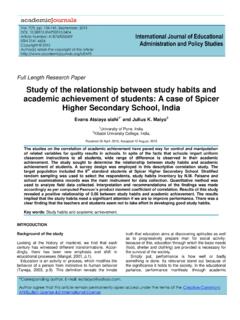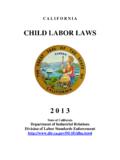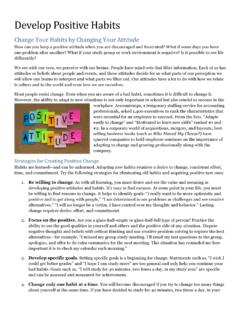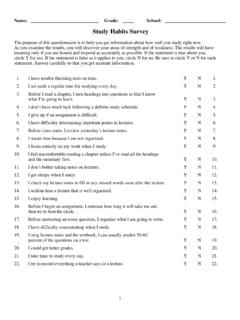Transcription of Framework for Success in Postsecondary Writing - ed
1 Framework for Success in Postsecondary WritingDeveloped by Council of Writing Program Administrators National Council of Teachers of English National Writing ProjectThe National Writing Project (NWP) is a network of educators working together to improve the teaching of Writing in the nation s schools and other settings. NWP provides professional development to teachers in a variety of disciplines and at all levels, from early childhood through university. Founded in 1974, NWP is a network of more than 200 university-based sites located in all 50 states, the District of Columbia, Puerto Rico, and the Virgin Islands.
2 NWP serves more than 130,000 participants each year. Council of Writing Program Administrators (CWPA) is a national association of Writing professionals with professional responsibilities for or interests in developing and directing Postsecondary Writing programs in two-year and four-year institutions. Members include full- and part-time Writing instructors; directors of Writing , Writing /communication across the curriculum programs, and Writing centers; and department chairs, division heads, and deans.
3 CWPA advocates, and helps its members advocate, for writers, Writing teachers, and effective Writing programs and provides mentoring, research, and resources to those administering Postsecondary Writing programs. National Council of Teachers of English (NCTE) is a professional association of educators in English studies, literacy, and language arts. NCTE is devoted to improving the teaching and learning of English and the language arts at all levels of education. NCTE promotes the development of literacy, the use of language to construct personal and public worlds and to achieve full participation in society, through the learning and teaching of English and the related arts and sciences of for Success in Postsecondary Writing (2011) by the Council of Writing Program Administrators (CWPA), the National Council of Teachers of English (NCTE), and the National Writing Project (NWP)
4 Is licensed under a Creative Commons Attribution-NonCommercial-NoDerivs Unported for Success in Postsecondary WritingDeveloped by Council of Writing Program Administrators National Council of Teachers of English National Writing Project1 Framework For Success in Postsecondary writingExecutive SummaryThe concept of college readiness is increasingly important in discussions about students prepa-ration for Postsecondary education. This Framework describes the rhetorical and twenty-first-century skills as well as habits of mind and experiences that are critical for college Success .
5 Based in current research in Writing and writ-ing pedagogy, the Framework was written and reviewed by two- and four-year college and high school Writing faculty nationwide and is endorsed by the Council of Writing Program Administra-tors, the National Council of Teachers of English, and the National Writing of mind refers to ways of approaching learning that are both intellectual and practical and that will support students Success in a variety of fields and disciplines. The Framework identifies eight habits of mind essential for Success in college Writing : Curiosity the desire to know more about the world.
6 Openness the willingness to consider new ways of being and thinking in the world. Engagement a sense of investment and involvement in learning. Creativity the ability to use novel approaches for generating, investigating, and representing ideas. Persistence the ability to sustain interest in and attention to short- and long-term projects. Responsibility the ability to take ownership of one s actions and understand the consequences of those actions for oneself and others.
7 Flexibility the ability to adapt to situations, expectations, or demands. Metacognition the ability to reflect on one s own thinking as well as on the individual and cultural processes used to structure Framework then explains how teachers can foster these habits of mind through Writing , reading, and critical analysis experiences. These experiences aim to develop students Rhetorical knowledge the ability to analyze and act on understandings of audiences, purposes, and contexts in creating and comprehending texts; Critical thinking the ability to analyze a situation or text and make thoughtful decisions based on that analysis, through Writing , reading, and research; Writing processes multiple strategies to approach and undertake Writing and research.
8 Knowledge of conventions the formal and informal guidelines that define what is considered to be correct and appropriate, or incorrect and inappropriate, in a piece of Writing ; and Ability to compose in multiple environments from traditional pen and paper to electronic For Success in Postsecondary writingIntroductionThe ability to write well is basic to student Success in college and beyond. Students can become better writers when they have multiple opportunities to write in classes across the curriculum throughout their education from elementary school through abilities to enroll in credit-bearing, college-level courses are increasingly associated with the idea of college readiness.
9 This document, written and reviewed by two- and four-year college and high school Writing teachers nationwide, describes habits of mind and experiences with Writing , reading, and critical analysis that serve as foundations for Writing in college-level, credit-bearing courses. Students who come to college Writing with these habits of mind and these experiences will be well positioned to meet the Writing challenges in the full spectrum of aca-demic courses and later in their careers. This document takes as a central premise that teaching Writing and learning to write are central to education and to the development of a literate citizenry.
10 Writing development takes place over time as students encounter different contexts, tasks, audiences, and purposes. Audience for the FrameworkThe primary audience for this Framework is instructors who teach Writing and include Writing in their classes at all levels and in all subjects. Additionally, because Writing is of concern for those inside and outside education, audiences beyond the classroom including parents, policymakers, employers, and the general public also can use this document. Context for the FrameworkTo describe the habits of mind and experiences that are central to Success in college and beyond, this document uses language and ideas from research in academic fields such as composition and rhetoric, Writing across the curriculum, and English education that focus on the development of Writing , reading, and analysis abilities inside and outside of school.

















